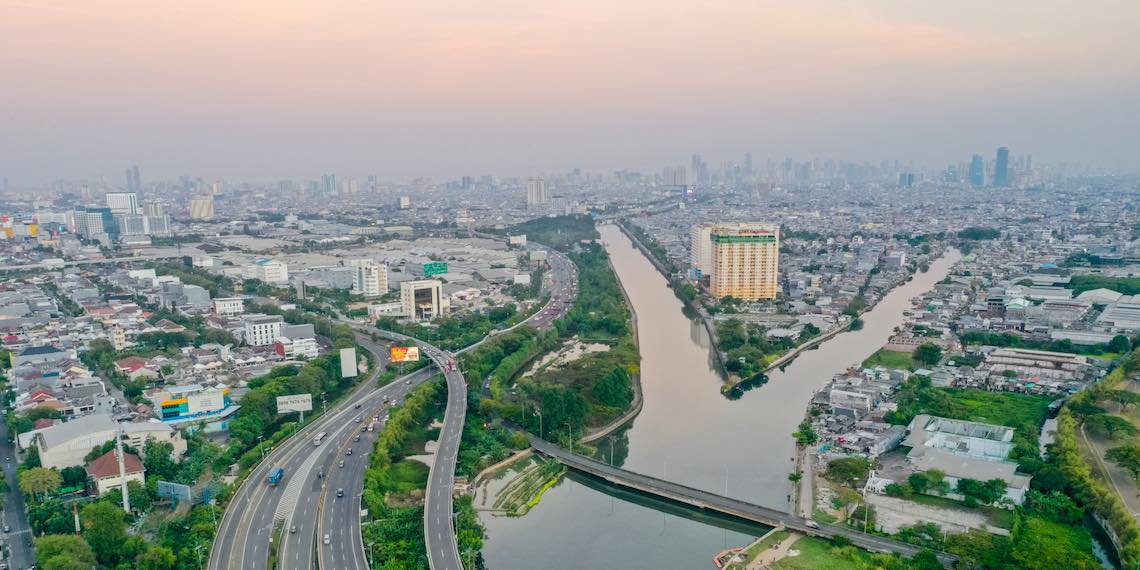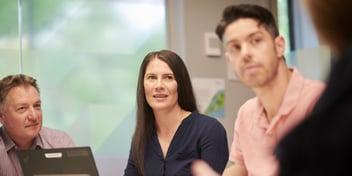Australia–Indonesia utility partnerships help improve social outcomes

Launched in 2019, the Australian Water Association’s Australia–Indonesia Water Utility Improvement Program (WUIP) has facilitated partnerships leading to impressive gender equality and social inclusion (GESI) outcomes across some of Indonesia’s leading water organisations.
In partnership with the National Water Supply Association for Indonesia (PERPAMSI) and supported by the Australian Water Partnership (AWP), the WUIP program pairs Australian water utilities with Indonesian counterparts.
The pairs work together to tackle specific challenges faced by Indonesian utilities by sharing technical skills and knowledge. Yarra Valley Water (YVW) has been paired with Tirta Sanjiwani, South Gippsland Water with PD PAL Jaya, and Unitywater with PDAM Surabaya.
The WUIP program launched at Ozwater’19, where the utility pairs met for the first time. Following this, Australian utility representatives visited Indonesia between July and August 2019, which included discussions and development of action plans for the program.
The action plans focused on knowledge sharing and capacity building around technical, financial and operational goals, including improved water and wastewater safety planning and quality management, improved asset management performance and strengthening of GESI awareness.
Stronger together
While the WUIP pairings focused on various knowledge sharing topics, Yarra Valley Water and Tirta Sanjiwani made significant progress in GESI initiatives, an outcome that YVW Chief Financial Officer Natalie Foeng said aligned naturally with YVW’s commitment to the United Nations Sustainable Development Goals (SDGs).
“Fundamentally, our strategy and our purpose is underpinned by the SDGs, including issues like gender equality and access to clean water and sanitation. After meeting with the Indonesian water sector in Jakarta, it was clear to see that Indonesian water utilities have very similar ambitions,” she said.
“We heard from Indonesian government ministers, who spoke to the importance of integrating gender equality into the water sector and their collective desire and ambition to do better. They spoke about the vital role women have to play when it comes to water management on all levels.
“We already shared many aligned objectives in terms of GESI goals, but also that this issue is not just about ticking a box — it's about the value and importance of women and diversity in water and how the SDGs underpin this approach.”
Foeng said YVW’s initial meetings with Tirta Sanjiwani focused on building trust, sharing stories and garnering a genuine understanding of the GESI challenges the Indonesian utility faced, and to create an action plan to address those challenges.
“Our visits were important as they gave us the opportunity to put together the action plan for initiatives moving forward. It was about having good conversations and developing trust and understanding,” she said.
“We did a lot of storytelling, sharing our experiences and perspectives, and spent time aligning our goals and our ambitions around these issues and why they are important.”
In terms of the specific GESI initiatives, establishing the action plan involved paying close attention to cultural consideration, said YVW People, Partnering and Operations Manager Julie Mouka.
“Gender equality and social inclusion is an emotive topic; it means different things within different cultures. We certainly had to unpack the cultural differences, but we focused on building relationships and connections first. From there, we identified ways that we could assist,” she said.
“GESI initiatives have the potential to impact the whole community, not just water utility operations and internal workplace goals. But we needed to first build trust before discussing these connections.”
Working towards inclusion
Since the WUIP program began, Tirta Sanjiwani has achieved outstanding improvements in GESI initiatives, including establishing an internal working group to progress actions and to facilitate input from employees regarding their needs.
This improvement has enabled greater inclusion for internal staff and external customers in decision making, as well as creating more opportunities for women.
YVW Planning Engineer Nova Irawati said Tirta Sanjiwani also established a management training program, a key improvement that has enabled a shift in workplace culture.
“While Tirta Sanjiwani didn’t have a lot of budget to dedicate to GESI initiatives, they were able to spend some of their grant money on training for the senior management around the importance of GESI, which has been very valuable,” she said.
“The training has resulted in creating much more focus on supporting and continuing other GESI related initiatives within the organisation.”
Irawati said one of those initiatives was the initiation of training and internships for college students and promoting job opportunities to senior college students.
“A lot of their technical employees are male. While they have female employees who are capable of technical roles, most of them are still doing administrative duties. One of the reasons is a lack of female applicants coming through from high school or university,” she said.
“YVW helped guide Tirta Sanjiwani on how to create a healthier pipeline in terms of attracting and recruiting more female applicants to apply for technical roles.
“And we’ve already seen additional female employees in technical areas, which is great. It’s a concrete improvement that we see coming out of this program and hopefully that will plant the seed for future employment, too.”
Tirta Sanjiwani has also developed more inclusive practices within their workplace to support employees, including flexible working hours (especially on ceremony days), offering counselling for all employees, and setting up return to work plans for employees that are sick.
Irawati said role modelling was important in fostering these changes, which reflected what Tirta Sanjiwani representatives had learned from visiting Yarra Valley Water.
“When Tirta Sanjiwani came to Melbourne, we invested time in showing them the ropes, but also they had discussions with our executive staff across the business,” she said.
“They could see that women had equal opportunity with men and that inclusion and diversity was embedded in the day-to-day culture of how we work.”
Participating in the program with Yarra Valley Water, Tirta Sanjiwani gained an understanding of GESI in the development of human resources approaches geared towards achieving company goals, a representative of Perumda Air Minum Tirta Sanjiwani said.
“GESI is about the ability to continuously optimise the diversity of human resources without discriminating against gender. During our mentoring process, we learned that this process requires the active participation of employees of all genders,” they said.
Insights from YVW in regard to increasing recruitment opportunities for women have been particularly helpful, with Tirta Sanjiwani already achieving a higher rate of female staff in technical roles.
“Our percentage of female technical staff has increased and the involvement of male employees in the administrative sector has begun to increase, too,” they said.
“But we are also creating a more inclusive workplace by looking more closely at employee placement based on the location of residence.”
The WUIP program also proved successful in helping assist Tirta Sanjiwani during the COVID-19 pandemic, including ensuring an inclusive approach to managing disruption, the representative said.
“We were able to get through the pandemic without reducing the welfare of employees and being able to donate to communities in need, especially people with disabilities,” they said.
“We also visited the Widya Guna Bedulu-Gianyar Foundation to share the love during the COVID-19 pandemic by providing moral assistance and basic necessities to children with special needs or disability.”
Lasting friendships
While the official WUIP program has come to completion, Mouka said the relationship between YVW and Tirta Sanjiwani will be ongoing — a testament to the depth in connection and benefits gained from working together to create positive changes and mutual learnings.
“The staff at Tirta Sanjiwani have become our friends. Moving forward, we are dedicated to helping and supporting them in any way we can. We’ve learned so much from them as well, personally and professionally,” she said.
“I think we all agree that we’ve been very lucky to have this experience together and our doors will always be open in future.”
While the YVW and Tirta Sanjiwani pairing has been particularly successful, the other Australia–Indonesia pairings have also achieved outstanding results.
Unitywater’s pairing resulted in PDAM Surabaya initiating a number of GESI initiatives, including the provision of friendly spaces for employees, disabled workers and customers, increased availability of toilets for disabled workers and customers, a nursing room for breastfeeding mothers, and woman empowerment for field and security jobs.
Furthermore, in February 2021 PDAM Surabaya received approval for a GESI proposal aimed at enabling female staff with technical backgrounds to move into positions within the organisations technical divisions.
Meanwhile, South Gippsland Water’s pairing with PD PAL Jaya has led to the development of local community initiatives across the Jakarta region, including the installation of toilet facilities in public areas to improve the management of waste and public health.
Ozwater'22 will include an international stream, Water for All, on 12 May 2022, with session details to be announced. Register today.



